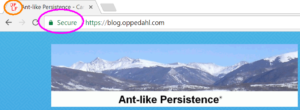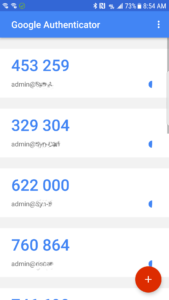
A year ago I posted about a speed test. Since then I have set up a new speed test that I like better.

Bluesky: @oppedahl.com
Musings about office technology from an intellectual property lawyer

A year ago I posted about a speed test. Since then I have set up a new speed test that I like better.
 The other day I was in the hallway outside of our firm’s office, standing at the top of a stepladder, stringing some fiber optic cable through the drop ceiling. A passer-by (a nice fellow from Redpoint Global, a software house next door to our office) saw the fiber optic cable that was being installed, and asked (he sounded envious) if we were getting gigabit ethernet. I had to disappoint him — we were merely running fiber from one part of our office to another, not to the Internet.
The other day I was in the hallway outside of our firm’s office, standing at the top of a stepladder, stringing some fiber optic cable through the drop ceiling. A passer-by (a nice fellow from Redpoint Global, a software house next door to our office) saw the fiber optic cable that was being installed, and asked (he sounded envious) if we were getting gigabit ethernet. I had to disappoint him — we were merely running fiber from one part of our office to another, not to the Internet.
But it got me thinking. What does it cost these days to get a gigabit connection to the Internet? I was astonished to learn that it costs less these days than it used to cost. For $110 per month, I now have gigabit internet in my home. I’ll describe the process and the results. Continue reading “Gigabit Internet service”
 You might wonder how fast your internet connection is. A typical way to do this is to download a large data file from someplace on the Internet, and to see how long it takes. You might wonder whether somewhere along the way, the data file is getting compressed. The way to eliminate that possibility is to pick a data file that is incompressible. To do this, you simply need to make sure the content of the data file is truly random. With this in mind, I offer a couple of PNG image files that are truly random in content. You can use them to test how fast your internet connection is.
You might wonder how fast your internet connection is. A typical way to do this is to download a large data file from someplace on the Internet, and to see how long it takes. You might wonder whether somewhere along the way, the data file is getting compressed. The way to eliminate that possibility is to pick a data file that is incompressible. To do this, you simply need to make sure the content of the data file is truly random. With this in mind, I offer a couple of PNG image files that are truly random in content. You can use them to test how fast your internet connection is.
 Summary: The savvy webmaster in 2018 should probably be using the free-of-charge and very convenient Let’s Encrypt system for “https://” certificates on web sites. But this post mentions that for the webmaster who can’t or won’t learn how to use Let’s Encrypt, and who instead stubbornly carries out annual (and fiddly manual) certificate renewals using SSL certificates that cost money, there is a certificate authority that provides SSL certificates for a mere $8.88 per year instead of the $60 or $149 per year that the webmaster is paying now.
Summary: The savvy webmaster in 2018 should probably be using the free-of-charge and very convenient Let’s Encrypt system for “https://” certificates on web sites. But this post mentions that for the webmaster who can’t or won’t learn how to use Let’s Encrypt, and who instead stubbornly carries out annual (and fiddly manual) certificate renewals using SSL certificates that cost money, there is a certificate authority that provides SSL certificates for a mere $8.88 per year instead of the $60 or $149 per year that the webmaster is paying now.
If you have a web site, you should probably forward this blog article to your webmaster. Hopefully he or she will be able to tell you that either (a) you are already using Let’s Encrypt or (b) you are only paying $8.88 per year for your SSL certificate!
Continue reading “Can’t or won’t use Let’s Encrypt? Cheap SSL cert”
 Our office, like most offices these days, is paperless. (Well, not exactly paperless. We go through many reams of paper per week. But I digress.) Being paperless, our important files are all maintained on file servers. Imagine how one’s office would be brought to its knees, or worse, if a such electronic files were to be lost! Which brings me to the concept of monthly disk health reports.
Our office, like most offices these days, is paperless. (Well, not exactly paperless. We go through many reams of paper per week. But I digress.) Being paperless, our important files are all maintained on file servers. Imagine how one’s office would be brought to its knees, or worse, if a such electronic files were to be lost! Which brings me to the concept of monthly disk health reports.

A long time ago we had a special clock with four time zones. We correspond a lot with clients in China. And we often need to keep track of when it will be midnight at the USPTO or at WIPO. The four-zone clock helped us keep track of these things.
But the special clock was noisy. It clicked as the second hand advanced, and somehow the clicks really carried through the office. Not only that, but all four of the clock faces clicked and the clicks were never quite simultaneous across the four faces. So there were 240 clicks per minute. We eventually scrapped that clock.
Now we have a new four-zone clock as you can see in the photograph. The clocks are silent. And the clocks synchronize their time with WWV.
Two of the clocks (the two in the middle) automatically update themselves for Daylight Saving Time. The one on the right will require manual adjustment four times per year (see blog article).
![]() We are all familiar with systems that force the user to select a password using a complexity rule. You know, the rules that say that the password is required to contain an upper case letter and a lower case letter and a numerical digit and at least one character that requires at least two hands to type on a keyboard.
We are all familiar with systems that force the user to select a password using a complexity rule. You know, the rules that say that the password is required to contain an upper case letter and a lower case letter and a numerical digit and at least one character that requires at least two hands to type on a keyboard.
And we are all familiar with systems that force the user to change his or her password frequently — every few months for example.
It turns out that these rules are outdated and should be scrapped.
Continue reading “Password complexity rules are out of date”
 I imagine some readers of this blog use an authentication app as part of a two-factor authentication process for various services. For a long time I have been using Google Authenticator (right) with some systems. I’d like to ask readers to please post a comment below if you use an authentication app, mentioning some of the services that you use it with. Continue reading “Seeking comments on authenticator apps”
I imagine some readers of this blog use an authentication app as part of a two-factor authentication process for various services. For a long time I have been using Google Authenticator (right) with some systems. I’d like to ask readers to please post a comment below if you use an authentication app, mentioning some of the services that you use it with. Continue reading “Seeking comments on authenticator apps”

We know the many reasons why it is good for a web site to be SSL protected (see the padlock in the purple oval at right). Reasons include:
(I have blogged about the importance of SSL protection here and here and here.) Why doesn’t everyone secure every web site with SSL? One reason might be cost. To secure a web site with SSL, it is necessary to obtain an SSL certificate from a Certificate Authority. The company we have traditionally used for obtaining SSL certificates charges $56 per year for a basic SSL certificate.
I was astonished, however, to learn recently that there is a free-of-charge Certificate Authority! Our firm operates quite a few web sites, and I am delighted that we will save some money in recurring costs by using the free-of-charge CA. Continue reading “SSL web site protection free of charge”
 Many readers may have followed with interest the news of a recently discovered triceratops fossil. I note that the dinosaur was found about seven miles east of the Westminster, Colorado office of Oppedahl Patent Law Firm LLC.
Many readers may have followed with interest the news of a recently discovered triceratops fossil. I note that the dinosaur was found about seven miles east of the Westminster, Colorado office of Oppedahl Patent Law Firm LLC.
So far as I am aware there is no connection between these places other than mere geographic proximity.